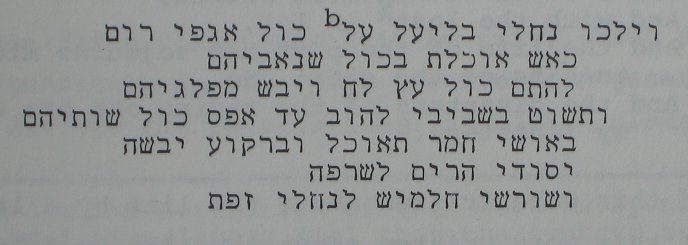Thanksgiving Hymn Preserves the Ancient Meaning of 'raqia'
The prophecy of Daniel 8 shows that Antiochus IV initiated a revision of the cosmology of the Old Testament, that redefined the 'raqia' of Genesis 1 with heaven, and that he assigned the diurnal rotation to the heavens. It is what is meant by "the continual was lifted up on high" in Daniel 8:11; the knowledge of the earth's rotation was stamped out, and replaced with the idea of the heavens revolving around the earth, which implied a rigid sphere of heaven or firmament.
A confirmation that a change in the meaning of 'raqia' occurred during the hellenistic period has come to light, in one of the scrolls from the Qumran community near the Dead Sea.
Among the first of the Dead Sea Scrolls discovered in the Judean desert in 1947, there was a work known as the 'Thanksgiving Hymns'. Eight copies, in various states of preservation, were found in different caves. They are Psalms written in Hebrew. One of them, Psalm 6 [1QH col 3:31], refers to the earth's crust as 'raqia' in a passage that describes a fiery conflagration, that destroys the trees, the streams, the dust of the earth, the foundations of the mountains, and even the souls of those in the abyss, or the underworld! The phrase containing the word is:
it devoureth the foundations of clay and the surface ('raqia') of the dry land
The word 'raqia' is the same as the word translated 'firmament' in
Genesis 1. In the above context it is also translated "expanse" or "extension" by some
scholars. In Isaiah
42:5, 44:24,
and Psalm
136:6 it refers to the surface of the earth. This use of 'raqia' in hymns of
the Qumran sect clearly shows it was commonly associated with the earth, rather than
heaven, when the hymn was written, probably in the 3rd or 2nd century BC. Translations of
the hymn by Kittel
and Holm-Nielsen and
Mansoor are provided.
|
|
Hebrew text showing the context in which 'raqia' is used for the earth in 1QH 3:29-31. The note associated with 'b' in the first line indicates a word "written above the line by a later hand." [From Kittel, p. 57]
It is to be expected that in the isolation of a desert community, hymns of the faithful would not have been affected by the revision of the cosmology of the scriptures initiated by Antiochus IV and the Jews who supported him. The hellenization campaign must have bypassed the Qumran community. But among the rest of the Jewish population, the original meaning of 'raqia' was thoroughly purged; originally it referred to the earth's crust, but its meaning was changed to the rigid sphere of heaven, by addition of "And God called the firmament Heaven" in Genesis 1:8.
The destruction of the Qumran community by Herod wiped out the population, and the scrolls remained where they were for 19 centuries, until their discovery by Bedouins in 1947. That explains the preservation of the ancient meaning of 'raqia' in some of the scrolls that were hidden in the caves.
Some scholars suppose the Qumran community was established by the 'hasidim' during the persecution of Jews in the reign of Antiochus IV. About that time is when the text of Genesis 1 was changed, and the 'raqia' was identified with the sky by the corruptions. The diurnal rotation was assigned to the heavens. While the 'raqia' was redefined in the wider Jewish community, its old meaning remained in the text of the hymn cited above.
This evidence of the change in the meaning of 'raqia' supports the new interpretation of Daniel's prophecy. The fraudulent change of the cosmology of the scriptures was initiated by Antiochus IV, and implemented by hellenized Jews who admired the Homeric cosmology with its rigid heaven. The message of the gospel in the Bible is not discredited by the flawed cosmology of the scriptures; those cosmological corruptions were foretold, and so they confirm the truth of prophecy! They show that Christ is in control of human destiny. He enlightens men, at the appropriate time.
The same prophecy foretold the scientific revolution, 2,300 years from the date of Daniel's vision. The atheists and skeptics who reject the scriptures, because of the so-called "rigid dome" cosmology it contains, and who sneer at the gospel of Christ, are victims of the fraud of Antiochus IV.
References
- Holm-Nielsen, Svend. 1960. Hodayot: Psalms from Qumram. Acta Theologica Danica. Vol 2. Universitetsforlaget I Aarhus.
- Kittel, Bonnie P. 1981. The Hymns of Qumran. Society of Biblical Literature 50, Scholars Press.
- Gary Martin, Raqi'a: Form and Function of the “Firmament” as a Celestial limes/limen in Israelite Cosmology, http://students.washington.edu/garmar/Raqia.pdf
- Mansoor, Menahem, 1961. The Thanksgiving Hymns. Studies on the Texts of the Desert of Judah, Vol 3. J. Van der Ploeg, ed. Wm. B. Eerdmans, Grand Rapids, Michigan.
- The text of Psalm 6 of the Thanksgiving Hymns from Qumran 1QH: /OP/1QH6txt.html
